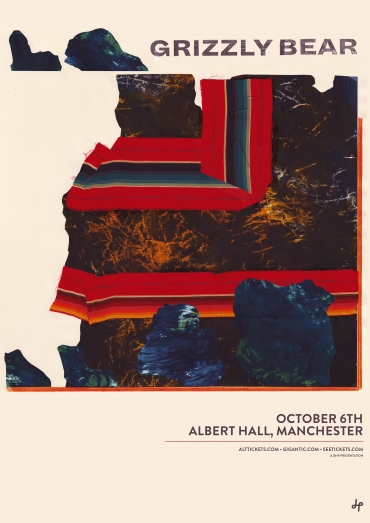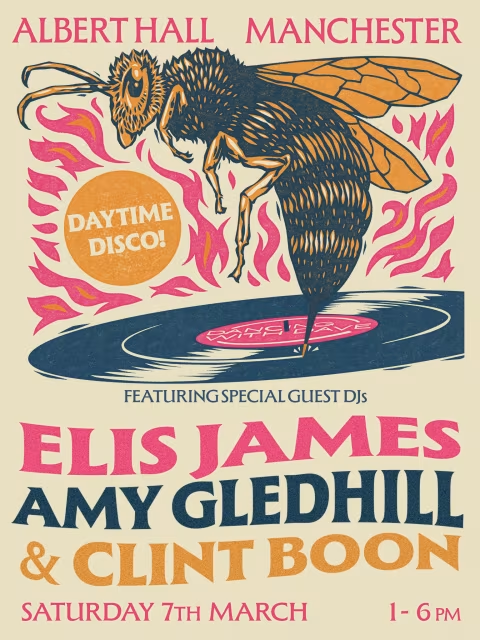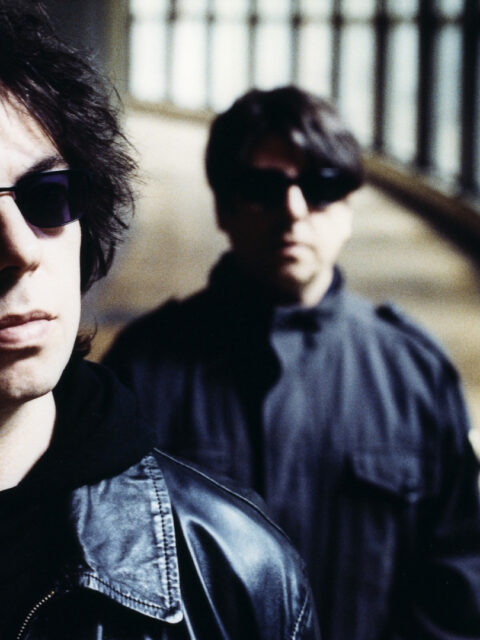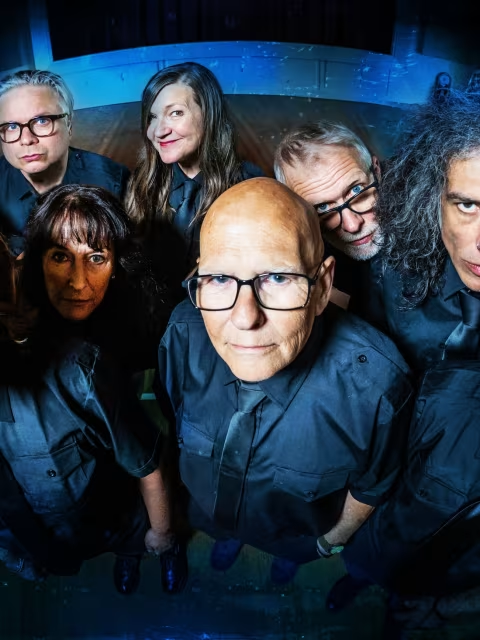When Grizzly Bear came to the end of the road with their fourth album, 2012’s ‘Shields’,
the future was unclear. No dramatic decisions were made, no arguments were had, but
there was a feeling as there always is with the foursome that a breather was required.
The band who emerged in 2004 in Brooklyn, New York, have forever functioned as a
self-described “democracy”. It’s equal and it’s fair but it can also take a lot of out of
them. And so they went their separate ways and bedded down in different corners.
Vocalist and songwriter Ed Droste adapted back to life in Los Angeles, his new adopted
home and decided to distance himself from music and the industry, vocalist, songwriter,
and multi-instrumentalist Daniel Rossen moved to a remote area of upstate New York
and continued to write and record on his own, drummer, songwriter, and multiinstrumentalist
Christopher Bear continued playing with various projects and worked on
scoring a tv series, and vocalist, multi-instrumentalist, songwriter, and producer Chris
Taylor decided to go West to LA after a one year stint in Berlin. He produced for other
artists and made a solo record under the moniker CANT. Taylor, however, got restless.
The band’s mediator since the beginning, his feet started to itch after the usual six
months of downtime. “I kinda kept writing everyone,” he says. “Telling them that we
should start making a record. I wanted to be making music with my band again. I stayed
busy, I wrote a cook book, produced other people, but my favorite thing to do was work
with my band. I was getting bored over here.” He laughs. While all four members were
strewn across their various corners, he took it upon himself to start a cloud account –
essentially a dropbox. The intention was to allow the band a gentler entry point for
starting to think about coming together again. It was new for them, less pressurized, far
more relaxed and a guaranteed prevention measure against creative stalemate. The
dropbox was a home for inspiration, mood boards, ideas for music, demos, even songs.
It was, however, quite a slow process, starting in March 2015. “Painfully slow,” chuckles
Taylor. They did have one song – ‘Losing All Sense’ – that made it to the record, but
Rossen was reticent to call this the beginning of something. The word ‘album’ was a
forbidden utterance at this point in time. “We got into the water with one toe at a time to
avoid freaking everyone out,” recalls Taylor. “Yeah this time around we came to it
slowly,” agrees Rossen. “Tip-toeing towards a conversation.”
“Chris Taylor started this motherfucker,” adds Droste. “I’m so grateful to him because I
don’t know whether it would have organically happened otherwise.” Taylor even bought
a guitar after five months of little progress and wrote in Big Sur. The song ‘Sky Took
Hold’ got its start in one of those sessions. Taylor wrote the song ‘Systole’ during his
time in Berlin, and it is his first lead vocal for the band. “I learned guitar so I could write
songs for the band,” he says, as eager as he was then to be in conversation about
Grizzly Bear. Once that catalyst came, there was still the question of whether or not it
was going to work. “I’m of the mindset that I never know if we’ll make another album, no
matter how good or bad things are,” says Droste. “In a way it’s a miracle this album
happened because for a while it was to be decided. When it started to come together
there were a lot of ideas. Some didn’t work. Eventually when things started to work we
were like, ‘Oh my god it’s happening.’”
That relief, that momentum, that sense of a band really relishing the chance to relocate
their mojo is apparent on the album, which wound up taking two years to make, via
remote writing trips taken variously by Taylor and Droste, and Bear and Rossen, then a
retreat to Allaire Studios in New York in June 2016 once there was more of a cohesive
collection of songs. That’s where they recorded a lot of 2009’s ‘Veckatimest’. In addition
to Allaire, they recorded in Vox Studios in Hollywood and at Taylor’s LA studio in Echo
Park. Rossen also continued to track parts for the record at his home upstate.
“It was so exciting when it was starting to work,” says Droste. Perhaps what was
different this time around was the communication barriers were set free. There was a
nakedness to receiving each other’s ideas and a lack of tying expectations to particular
results. The whole affair was positively zen. “I was coming at it like – I have to be open
with everything,” says Droste. “Let’s try anything and let it go. If it doesn’t work, it doesn’t
work. Don’t be precious or get upset when other bandmates don’t like it. Keep trying.”
The resulting fifth Grizzly Bear album ‘Painted Ruins’ benefits from having the songs
develop in a completely organic way. “We had a lot of fun making the record,” says
Rossen. “Even though there are serious themes we tried to keep the sound as light as
possible. Maybe it’s a matter of being a little older and not assuming that there should be
so much wrapped up in what we were doing.” That’s what immediately bleeds forth when
you listen through to the eleven tracks. “Does it sound totally different?” asks Droste,
champing at the bit to get the juggernaut started again. “More inviting?”
Indeed there’s a deep warmth, a flirtatiousness to the sonic ideas, and a sense of
playfulness that’s perhaps the most surprising of all. It’s a direct reflection of the joy they
experienced while making it. It chimes with collective exhales, and the genuine love that
came from reuniting with old friends. “You forget that you have this great thing going on
with us, even though it can be really difficult,” says Droste. “When we finally got together
it felt like there was a musical chemistry that was as real as it was when we were kids.
That was thrilling in a way that was still the case,” adds Rossen. You could almost say
that the band’s propensity to chuck lots of ideas at the wall to see which ones stuck was
the closest an established act can get to tapping into that energy that exists while
recording a debut.
For all four members the results of the sessions were unexpected. Droste points to
‘Mourning Sound’ and closing track ‘Sky Took Hold’. “That song was fleshed out in a
very different way, then one day they added an ominous horn section that repeats and it
changed the whole thing for me,” says Droste. “That’s what I love about working with
them. They just have ideas I would never have, and vice versa. It’s a challenge to be in a
democratic band with strong opinions but I also thank god because we get all these
different creative ideas that don’t come naturally. It’s very much four people. It always
has been. It always will for as long as we continue on. These are the three people who
continually surprise me.”
Rossen came up with the title ‘Painted Ruins’. As usual, the band are more comfortable
leaving the visuals, the lyrics, the themes to the listener’s imagination, so you can take
from their art what you will. “I don’t relate to a lot of explicit storytelling music,” explains
Droste, before making up something on the spot. “’Her name was Jenny and she broke
my heart and then I went on a cruise…’ Ok, don’t know Jenny, haven’t been on a cruise!”
Instead ‘Painted Ruins’ has a different meaning to each member of the band. “It’s the
idea of dressing up something that’s falling apart and making something out of a
situation that’s crumbling,” says Rossen. “In a way that’s how a lot of this music came
together. Some of it was a pastiche and it found its way into a cohesive form.”
There’s also clearly a connotation with the general breakdown that’s happening in the
wider world, which can also be mirrored in the band’s lives as they reached their late
thirties. “We all were hoping to achieve a sense of personal decay or breakdown
representing a larger whole or situation, not necessarily writing topical music but writing
personal music that could represent larger strife,” adds Rossen. For Bear, the album is
about personal reflection. “Observing yourself,” he explains. “Seeing how you’re
interacting when you’re going through change. It’s not a breakup record or a social
commentary record, there’s a lot of sides to the human experience.”
‘Painted Ruins’ isn’t a passing pleasure, it’s a body of work intended to be lived in. Its
psychedelic grooves, challenging composition and pensive lyrics require repeated listens
and develop significance, attachment and deep-rooted appreciation over time. That said
it strays from getting too intense or introspective. Some of the tracks take on a more
personal bent. The likes of ‘Wasted Acres’ and ‘Neighbors’, the former of which is about
Rossen’s life in upstate New York. “That tune started as a simple and direct lyric about
collecting firewood with my dog,” says Rossen. ‘Four Cypresses’, on the other hand, with
its refrain of “it’s ch






